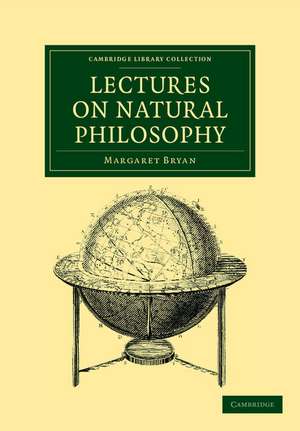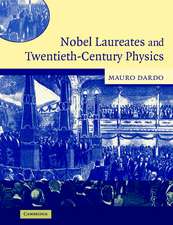Lectures on Natural Philosophy: The Result of Many Years' Practical Experience of the Facts Elucidated: Cambridge Library Collection - Physical Sciences
Autor Margaret Bryanen Limba Engleză Paperback – 11 oct 2011
Din seria Cambridge Library Collection - Physical Sciences
- 23%
 Preț: 833.69 lei
Preț: 833.69 lei - 11%
 Preț: 557.54 lei
Preț: 557.54 lei - 14%
 Preț: 595.04 lei
Preț: 595.04 lei - 23%
 Preț: 2112.84 lei
Preț: 2112.84 lei - 23%
 Preț: 1134.09 lei
Preț: 1134.09 lei -
 Preț: 372.11 lei
Preț: 372.11 lei -
 Preț: 466.14 lei
Preț: 466.14 lei -
 Preț: 332.28 lei
Preț: 332.28 lei -
 Preț: 422.01 lei
Preț: 422.01 lei -
 Preț: 509.82 lei
Preț: 509.82 lei -
 Preț: 466.95 lei
Preț: 466.95 lei -
 Preț: 443.42 lei
Preț: 443.42 lei -
 Preț: 422.01 lei
Preț: 422.01 lei -
 Preț: 329.56 lei
Preț: 329.56 lei -
 Preț: 255.68 lei
Preț: 255.68 lei -
 Preț: 329.56 lei
Preț: 329.56 lei -
 Preț: 464.99 lei
Preț: 464.99 lei -
 Preț: 418.91 lei
Preț: 418.91 lei - 19%
 Preț: 461.39 lei
Preț: 461.39 lei -
 Preț: 520.98 lei
Preț: 520.98 lei -
 Preț: 369.45 lei
Preț: 369.45 lei -
 Preț: 404.12 lei
Preț: 404.12 lei - 19%
 Preț: 455.00 lei
Preț: 455.00 lei - 19%
 Preț: 455.62 lei
Preț: 455.62 lei -
 Preț: 338.14 lei
Preț: 338.14 lei -
 Preț: 282.18 lei
Preț: 282.18 lei -
 Preț: 375.39 lei
Preț: 375.39 lei -
 Preț: 465.60 lei
Preț: 465.60 lei -
 Preț: 329.56 lei
Preț: 329.56 lei - 19%
 Preț: 498.49 lei
Preț: 498.49 lei -
 Preț: 421.20 lei
Preț: 421.20 lei - 19%
 Preț: 499.85 lei
Preț: 499.85 lei -
 Preț: 252.96 lei
Preț: 252.96 lei -
 Preț: 361.56 lei
Preț: 361.56 lei -
 Preț: 246.75 lei
Preț: 246.75 lei - 19%
 Preț: 534.09 lei
Preț: 534.09 lei -
 Preț: 419.51 lei
Preț: 419.51 lei -
 Preț: 521.57 lei
Preț: 521.57 lei - 19%
 Preț: 455.92 lei
Preț: 455.92 lei -
 Preț: 352.34 lei
Preț: 352.34 lei -
 Preț: 420.82 lei
Preț: 420.82 lei
Preț: 471.36 lei
Nou
Puncte Express: 707
Preț estimativ în valută:
90.19€ • 94.44$ • 74.81£
90.19€ • 94.44$ • 74.81£
Carte tipărită la comandă
Livrare economică 10-24 aprilie
Preluare comenzi: 021 569.72.76
Specificații
ISBN-13: 9781108038089
ISBN-10: 1108038085
Pagini: 470
Ilustrații: 37 b/w illus.
Dimensiuni: 170 x 244 x 24 mm
Greutate: 0.74 kg
Editura: Cambridge University Press
Colecția Cambridge University Press
Seria Cambridge Library Collection - Physical Sciences
Locul publicării:Cambridge, United Kingdom
ISBN-10: 1108038085
Pagini: 470
Ilustrații: 37 b/w illus.
Dimensiuni: 170 x 244 x 24 mm
Greutate: 0.74 kg
Editura: Cambridge University Press
Colecția Cambridge University Press
Seria Cambridge Library Collection - Physical Sciences
Locul publicării:Cambridge, United Kingdom
Cuprins
Dedication; Address to my pupils; Preface; Lecture the first. On the advantages arising from the proper application of philosophical knowledge - of the essential properties of matter - of that elementary principle called gravity - of the nature of fire and the surprising effects of heat; Lecture the second. Mechanics: The laws of motion considered - of the centre of gravity in bodies - the six mechanical powers described and their properties explained - of the vibrations of pendulums - the sublime evidences of the deity observable in the structure of the human body duly contemplated; Lecture the third, and the first on pneumatics. Of the mechanical properties of air: Air a material substance. Its invisibility, its weight, compressibility and elasticity, exhibited by a variety of pleasing and interesting experiments; Lecture the fourth. Pneumatics and acoustics: The air's resistance considered - of the wise construction and adaptation of the organs of birds for respiration and flight - of the organs of respiration in man - vegetables restore the vital principle to the air. The cause of winds explained, and their varieties accounted for on natural principles - air the medium of sound, of echoes and other effects of reflected sound; Lecture the fifth. On water and hydrostatics: The hydrostatic balance explained, and hydrostatic principles illustrated, by many pleasing experiments on the specific gravity of various substances; Lecture the sixth. A continuation of hydrostatic principles: As employed in aerostation, etc. Also in hydraulics, or the pressure and motion of fluids under various circumstances, as in pumps, syphons, air-vessels, etc.; Lecture the seventh. On magnetism: On the poles of a magnet and their effect on each other - of the direction, declination, and inclination of a magnet - of the variation of the needle, and the circumstances of the attractive and repulsive powers of a magnet exemplified by a great variety of beautiful and sublime experiments; Lecture the eighth, and the first on electricity. The known properties of electricity exhibited by a variety of evidences on conducting substances - the two popular theories considered and impartially appreciated; Lecture the ninth, and the second on electricity. Of charged glass - of the different effects of electricity on balls and points - the effects of conducting rods fixed to buildings considered - of the identity of lightning and electricity; Lecture the tenth, and the first on optics. The affections of light considered - the nature of lenses explained - the laws that govern the affections of light contemplated and clearly elucidated by a variety of evidences both theoretical and practical; Lecture the eleventh, and the second on optics. The observable adaptations of the organ of sight to the rays of light and their various affections - the nature of vision and its extensive usefulness contemplated; Lecture the twelfth, and the third on optics. The construction and operations of various optical instruments explained - the most curious and brilliant phenomena of colour displayed by the prism - on the various coloured appearances of the particles of light. Conjectures offered respecting the permanent colours of natural bodies; Lecture the thirteenth. On astronomy: The solar system explained, also the circumstances which prove the rotundity of the earth and the sun being the centre of the system, with other phenomena relating to the revolution of the planets, and the causes of eclipses, etc.; Concluding address; Astronomical tables; Table of specific gravities; Geometrical definitions with references; Explanation of certain signs used to express arithmetical and geometrical proportions or quantities; The starts very conspicuous at the latitude of London, with the names of all the constellations visible there, even those in which there are no remarkable start
Descriere
The lectures, published in 1806, of Margaret Bryan, a teacher who was an early proponent of scientific education for women.
















